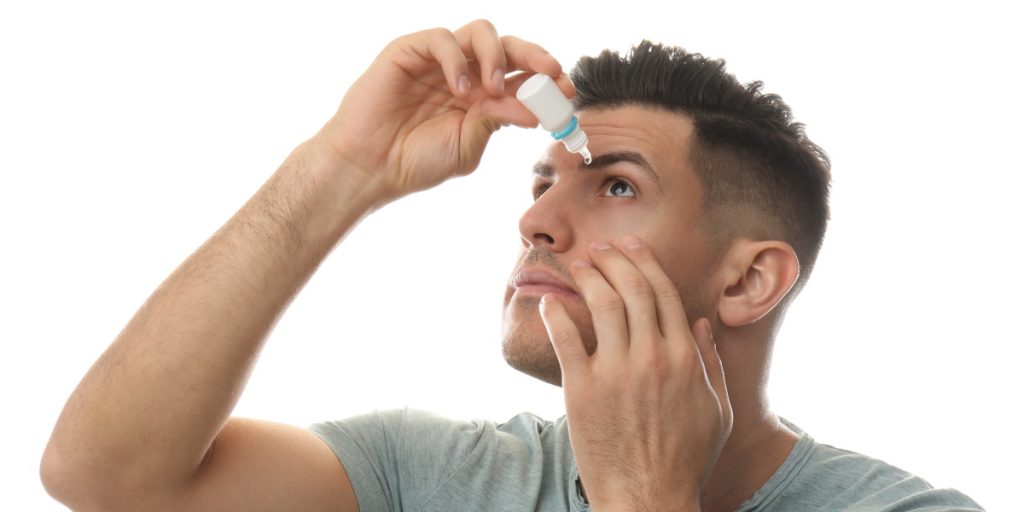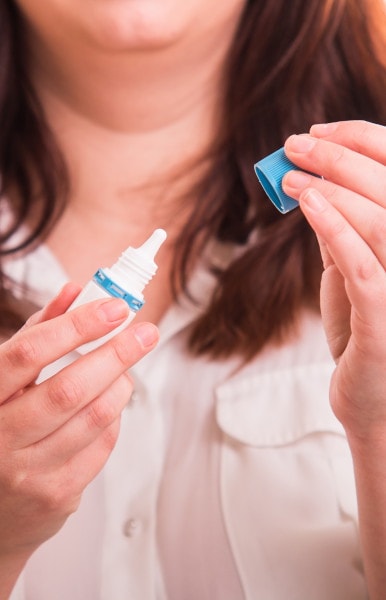Millions of people around the world use eye drops to treat red or dry eyes. According to reports, more than 117 million Americans used eye drops and eye washes in 2020.
There are various types of eye drops available for different conditions, including:
- glaucoma eye drops
- antibiotic eye drops
- lubricating eye drops
- presbyopia eye drops
- cataract eye drops
Over-the-counter eye drops (also known as artificial tears) effectively alleviate symptoms of dry eye syndrome and reduce irritation from contact lenses.
However, there are certain instances where eye drops are not exactly safe.

Eye drops and bacterial infections
Eye drops are mostly safe when used according to your eye doctor’s advice (and if used for eyes only!). But you may have heard about an eye drop brand that was recently found to be unsafe.
In collaboration with the Food and Drug Administration, the Centers for Disease Control and Prevention (CDC) investigated the link between Pseudomonas aeruginosa — a drug-resistant germ — and Ezricare Artificial Tears. Laboratory testing of the ocular specimens identified 55 patients with a rare strain of P. aeruginosa bacteria.
People using Ezricare Artificial Tears were told to immediately discontinue use while the investigation went on. The eye drops resulted in permanent vision loss in three people and one death.

Eye drop tip contamination
Generally, the problem isn’t some type of bacterium hiding in your eye drops, it’s contamination.
The tip of your eye drops can be exposed to bacteria which then lead to ocular infection. To protect your eye health, keep your eye drops’ lid clean and avoid touching your eye (or other surfaces) with the dropper.
If the cornea gets infected, it can lead to inflammation of the eye layer — a condition called bacterial keratitis. The condition is the leading cause of monocular blindness in the developing world.
What happens if you drink eye drops?
Eye drops are safe when used properly. However, in 2020, eye drops made headlines when a woman killed her husband by putting eye drops in his drink. Red-eye drops contain tetrahydrozoline, a chemical that causes blood vessels to narrow, reducing eye redness.
As the name implies, “red eye drops” are meant for use in the eyes, not your digestive tract.
Why use eye drops?
Eye drops are the best method we have for treating many eye problems.
For example, antibiotic eye drops are our first line of treatment for bacterial conjunctivitis (more commonly known as “pink eye”). Viral conjunctivitis can sometimes be treated with antiviral eye drops, but more commonly is left to run its course.
Over-the-counter eye drops provide temporary relief for dry eyes, lubricating them and protecting them from potential damage. Lubricating eye drops can also keep contact lenses moist throughout the day, reducing your risk of a scratched cornea.
Eye drops can also be used to treat or manage allergic conjunctivitis. When exposed to allergens such as dust or pollen, your eyes can become irritated. Allergy symptoms are generally less severe than the symptoms of an eye infection. However, allergies can also result in itching, watery eyes, and the white part of the eye (conjunctiva) becoming red and irritated.
There is even a type of eye drop that can treat presbyopia (age-related blurred vision) potentially replacing the need for reading glasses.
Do eye drops expire?
Clinicians and health care providers recommend properly disposing of expired eye drops because they have an increased risk of side effects. Many eye drops are “preservative-free,” meaning they don’t contain ingredients that prevent bacterial growth.
What to do if I develop complications from using eye drops?
If you experience side effects or irritation from using eye drops, talk to your ophthalmologist. Stinging or burning, watery eyes, and blurred vision may be signs of an allergic reaction.
Why trust your eyesight to Assil Gaur Eye Institute?
Under Dr. Assil’s leadership, the Assil Gaur Eye Institute has assembled a team of top ophthalmology specialists from around the country who continue AGEI’s tradition of offering patients the highest quality of specialist eye care in the United States. In keeping with the founding principles of AGEI, our doctors have managed to keep their clinics comfortable and familiar, much like how family-run medical practices used to be.
Today, the Assil Gaur Eye Institute is nationally recognized for its compassionate patient-centric care, its commitment to pioneering advances in ophthalmology, and its dedication to supporting the health and well-being of its patients and community.
Please call (866) 945-2745 or make an appointment online.
At Assil Gaur Eye Institute we take our patients’ safety seriously. Our facility’s Covid-19 patient safety procedures exceed all CDC recommendations to minimize the spread of the coronavirus. Masks are required in our institutes at all times.
We are conveniently located for patients throughout Southern California and the Los Angeles area at locations in or near Beverly Hills, Santa Monica, West Los Angeles, West Hollywood, Culver City, Hollywood, Venice, Marina del Rey, Malibu, Manhattan Beach, and Downtown Los Angeles.













